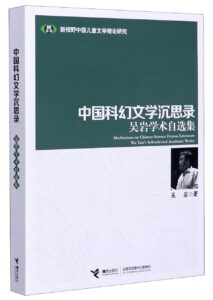
Wu Yan 吴岩
Nanning, China: Relay Press (接力出版社), July 2020
Reviewed by Shanky Chandra (Doctoral Candidate, Jawaharlal Nehru University and HYI Visiting Fellow)
Professor Wu Yan, one of the founders of the field of science fiction in China and a leading scholar, compiled 40 years of important papers into the volume “Meditations on Chinese Science Fiction Literature” 《中国科幻文学沉思录》. The compilation of these 40 articles is extremely multi-level and efficient in the transmission of information. They are a history of Chinese science fiction literature and research from the beginnings to the full development, and even radiating creativity to the fields of visual art, affecting the national image and the top-level design of society. Wu Yan grew from a young author to a cross-border researcher and educator with professional psychology and sociology tools. He also clearly benefits from the multidisciplinary thinking of science fiction itself and the tolerance and universality that must coexist with imagination. In the era of specialization, this is a rare quality, and with the rise of scientific and technological humanistic reasoning, it is regarded as a manual for creative thinking.[1]
The book is divided into four parts: research on science fiction theory (科幻理论研究), research on the history of Chinese and Western science fiction (中西科幻史研究), research on writers’ works (作家作品研究), and research on science fiction empowerment. Unlike most contemporary Chinese science fiction academic works, even those without a deep understanding of the field will have no difficulty in reading this book. Wu Yan, through his straightforward guidance and use of many carefully selected examples, will expand any reader’s interest in Chinese science fiction while also providing them with a panoramic overview of the field rather than one bogged down in the ‘academic hills’ of identification/terminology.[2] This shows that Wu Yan’s academic writing has maintained a clear and easy style for decades, and tackles essential questions such as: What is the difference between science fiction and popular science? Why is it so difficult to define? What is the difference between soft science fiction and hard science fiction in the Chinese and English world? How are technological construction and literary construction realized in science fiction works?
Taking the fields of art history and archaeology as examples, James Cahill, Fang Wen, Zhang Guangzhi and others who can reach this reading standard are also famous.[3] Qi Xiaochang’s writing is often based on extensive accumulation and delicate first-hand experience with strong logical ability, a keen and unique sense of touch, and pure adherence to immersion as the foundation. The multi-dimensional references to social science tools, technology, history, and art in “Meditation Records” have even eliminated the common obscurity in literary theory, making it a forerunner’s note with a liberal writing style and no professional reading limit. It seems the presentation of “universalism” is extremely demanding for scholars.[4]
The author has little doubts about Chinese original science fiction literature, and he is concerned about how to make academic research and judgment in this field more interdisciplinary, covering different fields such as sociology, psychology, textology, science and technological history, Chinese and foreign literature history. Wu Yan’s depiction of Chinese original science fiction literature is exhaustive and has unique insight. From the late Qing dynasty to the present, the evolution of Chinese science fiction literature throughout various periods is addressed in this book. The author also approaches his advocacy and esteem of Chinese original science fiction literature from numerous perspectives, providing readers with both criticism and praise for each work. As a result, the speciality, category specificity, and spatial peculiarity of Chinese original science fiction texts have become a new field of great academic imagination.
This book is analytically rich and presents a valuable perspective for understanding ‘Chinese science fiction’ and a comparison between Liu Cixin’s novels 《三体》 and the “new wave of Chinese SF” 《中国科幻的新潮》. Although the book is empirically rich in science fiction history, it mainly focuses on Chinese science fiction. The content of this book is rigorous in textual research, precise in its use of quotations from sources, and grand in the panoramic overview of case studies it provides to readers. All in all, Wu Yan’s Meditations on Chinese Science Fiction is an essential read not only for researchers but for general science fiction readers as well.
[1]These excerpts are taken from “Advancing and Onlooking: Reading’ Meditation on Chinese Fiction” (oncoming review) by Zhou Rongrong, doctoral candidate of Central Academy of Fine Arts, Beijing, China. (先行与冷观:读《中国科幻文学沉思录 —— 吴岩学术自选集》周融荣
[2]Ibid.
[3]Ibid.
[4]Ibid.
